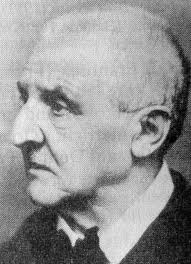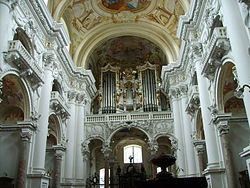September 3, 2012.Anton Bruckner was born on September 4, 1824.This very fact gives one pause: Bruckner was born 9 year before Brahms!Brahms has been part of the canon for more than a century, one of the “Three Bs.”The music of Bruckner, while clearly of the Romantic tradition, feels new even today, fresh and absolutely original.Its history was difficult; initially, Vienna rejected it.Then, forty years after Bruckner’s death, the Nazis appropriated it, to some extent undermining it for the following generations.Still, thanks to Bruno Walter, Wilhelm Furtwängler, Karajan, Günter Wand, Sergiu Celibidache, and many other conductors, Bruckner’s music thrives today, becoming a touchstone of sorts for any great orchestra.
Bruckner was born in a small village outside of Linz, Austria.His first music teacher was his father, a local schoolmaster.He started playing the organ very early, and greatly improved in his second school, where the schoolmaster was an organist.After his father’s death, the 13 year-old Anton was sent to the monastery in Sankt-Florian, which had a great Baroque organ (see the photo below).He sometimes played the instrument during services.The following years were very difficult for Bruckner: his mother sent him to a teacher’s seminar, following which he had a number of low-paying teaching positions in St.-Florian and other towns.In 1855 Bruckner started studying musical theory and counterpoint with the Viennese composer, organist, and music theorist Simon Sechter.They mostly corresponded by mail, but Bruckner also made several visits to Vienna.That was also the time when Bruckner was introduced to the music of Wagner, which he liked and studied diligently.When Sechter died in 1868, the Vienna Conservatory offered his position to Bruckner.He accepted and taught there for a number of years.He later taught at the Vienna University.Bruckner wrote most of his symphonies while in Vienna (there was an unnumbered “study” symphony that he wrote while in St.-Florian, and started his 1st symphony there, although the revisions were written in Vienna).
A man of genius, Bruckner was a very unusual person, and very unusual as a composer.Mahler, who admired him, called him “half simpleton, half God.”He was a direct opposite of the archetypical creator, an auteur impervious to all criticism.Very humble and unsure of himself, he sought advice from everybody, from his students to conductors, and readily incorporated their suggestions.He significantly reworked many of his symphonies.Symphony no. 1 has three versions, as do symphonies 2 and 4.Symphony no. 3 has four different revisions.A provincial, he never got comfortable living in the capital.That the musical tastes in Vienna were dictated by the famous critic Eduard Hanslick, an admirer of Brahms and anti-Wagnerite, didn’t help either: Hanslick strongly disliked Bruckner’s music.Bruckner never married, although he made numerous proposals to very young girls.He died on October 11, 1896, at age 72, and was buried under his beloved organ in St.-Florian.
We’ll hear the 3rd movement (Scherzo) of his Symphony no. 4.There’s a story connected to this symphony.Hans Richter, the famous conductor who by then had worked with Wagner, was rehearsing for the premier of the symphony.According to Richter, "When the symphony was over, Bruckner came to me, his face beaming with enthusiasm and joy.I felt him press a coin into my hand. 'Take this' he said, 'and drink a glass of beer to my health.'” Richter took the coin, and later wore it on his watch-chain.We’ll hear the original version (there are two others, each in more than one form.Even Mahler got into the game and created a version).It’s performed by Staatskapelle Dresden, Herbert Blomstedt conducting (to listen, click here, courtesy of YouTube).
Bruckner 2012
September 3, 2012. Anton Bruckner was born on September 4, 1824. This very fact gives one pause: Bruckner was born 9 year before Brahms! Brahms has been part of the canon for more than a century, one of the “Three Bs.” The music of Bruckner, while clearly of the Romantic tradition, feels new even today, fresh and absolutely original. Its history was difficult; initially, Vienna rejected it. Then, forty years after Bruckner’s death, the Nazis appropriated it, to some extent undermining it for the following generations. Still, thanks to Bruno Walter, Wilhelm Furtwängler, Karajan, Günter Wand, Sergiu Celibidache, and many other conductors, Bruckner’s music thrives today, becoming a touchstone of sorts for any great orchestra.
clearly of the Romantic tradition, feels new even today, fresh and absolutely original. Its history was difficult; initially, Vienna rejected it. Then, forty years after Bruckner’s death, the Nazis appropriated it, to some extent undermining it for the following generations. Still, thanks to Bruno Walter, Wilhelm Furtwängler, Karajan, Günter Wand, Sergiu Celibidache, and many other conductors, Bruckner’s music thrives today, becoming a touchstone of sorts for any great orchestra.
Bruckner was born in a small village outside of Linz, Austria. His first music teacher was his father, a local schoolmaster. He started playing the organ very early, and greatly improved in his second school, where the schoolmaster was an organist. After his father’s death, the 13 year-old Anton was sent to the monastery in Sankt-Florian, which had a great Baroque organ (see the photo below). He sometimes played the instrument during services. The following years were very difficult for Bruckner: his mother sent him to a teacher’s seminar, following which he had a number of low-paying teaching positions in St.-Florian and other towns. In 1855 Bruckner started studying musical theory and counterpoint with the Viennese composer, organist, and music theorist Simon Sechter. They mostly corresponded by mail, but Bruckner also made several visits to Vienna. That was also the time when Bruckner was introduced to the music of Wagner, which he liked and studied diligently. When Sechter died in 1868, the Vienna Conservatory offered his position to Bruckner. He accepted and taught there for a number of years. He later taught at the Vienna University. Bruckner wrote most of his symphonies while in Vienna (there was an unnumbered “study” symphony that he wrote while in St.-Florian, and started his 1st symphony there, although the revisions were written in Vienna).
A man of genius, Bruckner was a very unusual person, and very unusual as a composer. Mahler, who admired him, called him “half simpleton, half God.” He was a direct opposite of the archetypical creator, an auteur impervious to all criticism. Very humble and unsure of himself, he sought advice from everybody, from his students to conductors, and readily incorporated their suggestions. He significantly reworked many of his symphonies. Symphony no. 1 has three versions, as do symphonies 2 and 4. Symphony no. 3 has four different revisions. A provincial, he never got comfortable living in the capital. That the musical tastes in Vienna were dictated by the famous critic Eduard Hanslick, an admirer of Brahms and anti-Wagnerite, didn’t help either: Hanslick strongly disliked Bruckner’s music. Bruckner never married, although he made numerous proposals to very young girls. He died on October 11, 1896, at age 72, and was buried under his beloved organ in St.-Florian.
who admired him, called him “half simpleton, half God.” He was a direct opposite of the archetypical creator, an auteur impervious to all criticism. Very humble and unsure of himself, he sought advice from everybody, from his students to conductors, and readily incorporated their suggestions. He significantly reworked many of his symphonies. Symphony no. 1 has three versions, as do symphonies 2 and 4. Symphony no. 3 has four different revisions. A provincial, he never got comfortable living in the capital. That the musical tastes in Vienna were dictated by the famous critic Eduard Hanslick, an admirer of Brahms and anti-Wagnerite, didn’t help either: Hanslick strongly disliked Bruckner’s music. Bruckner never married, although he made numerous proposals to very young girls. He died on October 11, 1896, at age 72, and was buried under his beloved organ in St.-Florian.
We’ll hear the 3rd movement (Scherzo) of his Symphony no. 4. There’s a story connected to this symphony. Hans Richter, the famous conductor who by then had worked with Wagner, was rehearsing for the premier of the symphony. According to Richter, "When the symphony was over, Bruckner came to me, his face beaming with enthusiasm and joy. I felt him press a coin into my hand. 'Take this' he said, 'and drink a glass of beer to my health.'” Richter took the coin, and later wore it on his watch-chain. We’ll hear the original version (there are two others, each in more than one form. Even Mahler got into the game and created a version). It’s performed by Staatskapelle Dresden, Herbert Blomstedt conducting (to listen, click here, courtesy of YouTube).